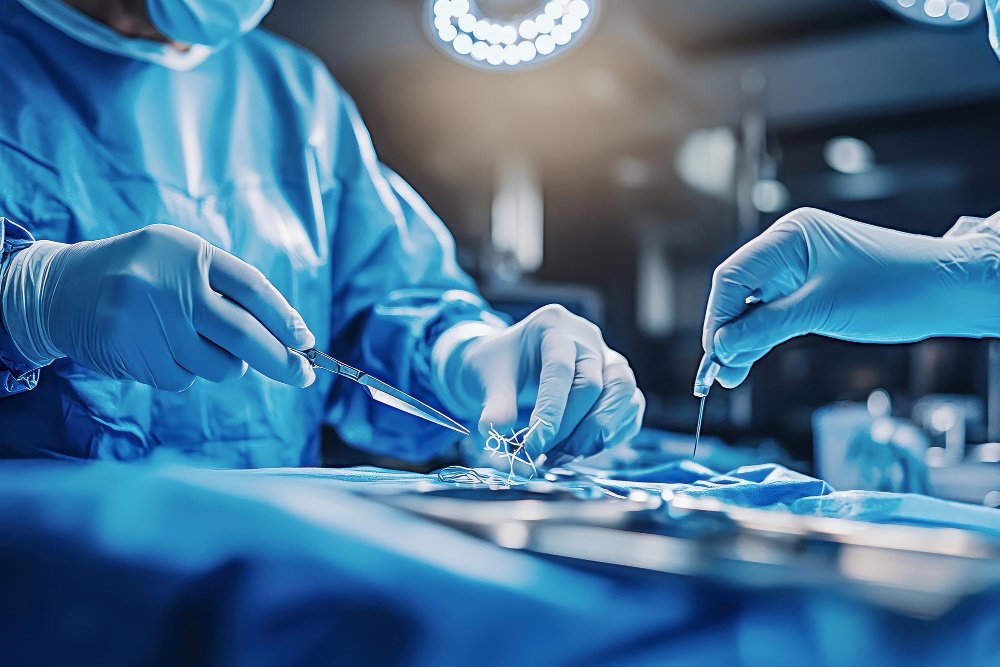Why Choose GMS for GERD Surgery in Cyprus?

Expert Surgeons Specializing in GERD Surgery
Our surgeons are highly skilled in performing GERD treatment surgeries, ensuring a tailored approach to each patient’s unique condition.

Advanced Facilities
Advanced technology ensures the highest quality care for your duodenal surgery.

Personalized GERD Treatment Plans
We work closely with each patient to create a treatment plan that aligns with their health needs, lifestyle, and GERD severity.

Comprehensive Post-Surgery Support
Our care extends beyond the surgery, providing follow-up visits, dietary guidance, and lifestyle recommendations to ensure the best outcomes.

Minimally Invasive Techniques
We offer laparoscopic GERD surgery, which involves smaller incisions, less pain, and faster recovery times compared to traditional open surgery.

Medical Tourism Services for International Patients
We offer full medical tourism support, including assistance with travel, accommodation, and personalized care throughout your treatment journey.
Our Gastroesophageal Reflux Disease (GERD) Surgery Options
At GMS Cyprus, we provide advanced surgical options to treat Gastroesophageal reflux disease (GERD), depending on the severity of the condition and individual patient needs. Also we provide:
Laparoscopic Gastric Sleeve Plication Surgery
This is a revolutionary weight loss surgery that does not involve removing any part of the stomach. Instead, it uses sutures to create a smaller stomach sleeve, reducing its capacity. This method preserves the stomach’s natural nutrient absorption, making it an excellent alternative to other gastric surgeries.
Laparoscopic Sleeve Gastrectomy
Known simply as the Gastric Sleeve, this procedure involves removing about 75% of the stomach to create a smaller “sleeve”-shaped pouch, approximately the size of a banana. Unlike some surgeries, it does not bypass the intestines or require implants.
Laparoscopic Gastric Bypass (RNY) Surgery
Often called the “gold standard” in bariatric surgery, the Roux-en-Y Gastric Bypass is a comprehensive approach combining restriction and malabsorption to aid in weight loss. It reduces the stomach size and reroutes food directly to the small intestine, bypassing part of the digestive system.
Laparoscopic Duodenal Switch Surgery
The Biliopancreatic Diversion with Duodenal Switch (BPD-DS) combines elements of the gastric sleeve and bypass for both restriction and malabsorption. It is a highly complex yet effective procedure, often resulting in patients losing 75-80% of excess weight.
Gastric Band Surgery (Gastric Ring)
Gastric band surgery involves placing an adjustable band around the upper part of the stomach, creating a small pouch. This reduces the amount of food the stomach can hold, helping patients feel full with smaller portions. It is a minimally invasive procedure with adjustable settings, allowing the surgeon to tighten or loosen the band as needed. It typically results in gradual and steady weight loss over time.
Hernia Surgery
In some cases, individuals with obesity may suffer from hernias, which can complicate weight loss efforts. Bariatric hernia surgery is performed to repair the hernia and restore the abdominal wall’s integrity. This surgery is important for patients undergoing weight loss surgery, as it helps to ensure a stable and comfortable recovery.
Gastroesophageal Reflux Disease (GERD) Surgery
GERD surgery is often needed for individuals who experience chronic acid reflux, which can worsen with obesity. This procedure aims to correct the underlying issues causing reflux by tightening the lower esophageal sphincter, reducing the amount of stomach acid that can flow back into the esophagus. It is commonly performed in combination with bariatric weight loss surgery for patients suffering from both conditions.
Gallbladder Removal (Cholecystectomy)
Gallbladder removal, also known as cholecystectomy, is a common procedure for patients who experience gallstones or other gallbladder-related complications. Obesity increases the risk of gallstones, and many bariatric surgery patients may require this procedure to prevent further complications. The surgery is performed laparoscopically, ensuring a quick recovery with minimal scarring.
Bariatric Revision Surgery
Bariatric revision surgery is offered to patients who have previously undergone weight loss surgery but have not achieved the desired results or have experienced complications. Revision procedures may include adjusting the existing surgery, such as tightening a gastric band, converting to a gastric bypass, or other modifications to address issues like weight regain or surgical failure. Our surgeons assess each case individually to determine the most appropriate revision surgery.
Understanding GERD Surgery at GMS Cyprus
Gastroesophageal reflux disease (GERD) surgery is a procedure designed to correct the underlying causes of GERD, often by strengthening the lower esophageal sphincter (LES) or repairing a hiatal hernia. GERD treatment surgery is recommended for patients who do not respond to medications or who suffer from severe GERD symptoms that impact their quality of life. The goal of the surgery is to prevent acid from flowing back into the esophagus, thus alleviating symptoms and preventing complications like esophageal ulcers or cancer.
How To Get A Medical Offer?
SUBMIT A REQUEST
SEND YOUR MEDICAL HISTORY
SEND YOUR MEDICAL HISTORY
FAQ About GERD Surgery
We offer several GERD treatment surgery options, including laparoscopic Nissen fundoplication, laparoscopic Toupet fundoplication, and the LINX Reflux Management System, each tailored to the severity of your Gastroesophageal reflux disease (GERD).
Recovery time after Gastroesophageal reflux disease (GERD) surgery varies but typically takes 1-2 weeks for light activities, with full recovery occurring in 4-6 weeks, depending on the procedure performed.
Most patients experience mild discomfort after GERD treatment surgery, which can be managed with prescribed medications. Pain usually decreases as the body heals from the surgery.
Gastroesophageal reflux disease (GERD) surgery is highly effective in providing long-term relief for most patients by preventing acid reflux. However, some patients may still experience mild symptoms, which can be managed with lifestyle changes or occasional medication.
In most cases, after GERD surgery, patients are able to stop taking GERD medications. However, some individuals may still need medications in the early recovery period or for occasional symptoms.
Yes, GMS Cyprus offers comprehensive medical tourism services for international patients, including assistance with travel, accommodation, and personalized medical care throughout your GERD treatment surgery.
Testimonials
After a consultation with Dr. Amir, I was surprised to learn that my health insurance does not guarantee that he will be the surgeon to perform the procedure.
That is when I contacted GMS, who explained how I could have the surgery performed by the physician of my choice - which gave me peace of mind.
It is very important for me to share my experience as the service I received through GMS exceeded any similar experience in Israel:
From the beginning I was assigned a GMS representative from Israel, who explained in detail what my experience would be and answered all my questions about the operation and the treatment process. (Thanks, Roy!)
All I had to do was fill out the application form.
GMS representatives took care of everything themselves!
They contacted the insurance company on my behalf and even had them check the status of the application until the financial commitment for the surgery was received.
We agreed with on the surgical date, booked the flights at a convenient time for me and also dealt with the hotel reservation. The GMS staff even reviewed the menu and took any dietary restrictions into consideration on my behalf.
We were picked up from the airport in Larnaca, Cyprus where we met the wonderful Oria, who accompanied us throughout the entire visit and took care of every detail; from registration to preparation for the operation.
This is essentially a VIP service that made the entire experience relaxed and stress free. The assigned coordinators continued caring after my return to Israel. They were interested in my recuperation post operatively and also ensured all financial matters were dealt with; all this, by the way, without any commissions or payouts on my part, but directly with my insurance. In a word - an amazing experience! In short - I recommend it!
Thank to GMS, thank you Roy, thank you Uriah and thank you Dr. Oron.

I needed a unique procedure which is not performed in Israel and I turned to them.
Over a telephone conversation with GMS representative Roy, I felt caring attention and confidence that he would help in everything. He accompanied us throughout the entire process, before the flight and even after.
In addition to Roy, we would like to sincerely thank Oriya, our allocated Israeli speaking patient coordinator of the company in Cyprus.
Even before our departure, Oriya was in touch with us helping with any issues and made sure that we arrived fully prepared - taking into account the smallest details; even to the point of finding out our food preferences, and despite the late hour of our arrival at the hotel, she ensured an exquisite meal was waiting for us in the room. Oriya greeted us upon arrival and truly made us feel like we were her personal guests. She accompanied us throughout the entire day of the operation - attentively, with endless care and continued patience.
I felt like I had a good friend with me in the hospital. This kind of treatment doesn’t happen very often... At the end of the day we parted, hugging each other, and Oriya gave recommendations on where to go and what to do in the time remaining before returning home.
I just don't have enough words to thank GMS and Oriya for everything. I can only recommend with a reassurance that those who need it should use their services.

Roy – thank you for your patience, quick responses (minutes!), availability, caring and clear explanations! You are inimitable! Oriya - you are amazing! Thank you for every smile, hug, help, guidance, explanation... really! You are simply amazing!
Every time I was asked by friends and family about the surgery, I immediately started talking about your amazing service! I felt warmth and love, and everyone who was with me felt the same! We never stop talking about you, and really, only good things!
You have entered our hearts! Thank you very much for everything! I hope to see you in the future, under different circumstances.







